National
Doctors attending to Dr Govinda KC say he needs critical care
The orthopaedic surgeon has been on his 19th hunger strike for the past 24 days.
Post Report
Doctors attending to Dr Govinda KC, who is on his 19th fast-unto-death for the last 24 days, have warned of life-threatening events if immediate measures are not taken.
According to a medical bulletin issued by Dr Subhash Prasad Acharya, coordinator of KC’s medical team, the senior orthopaedic surgeon has fatigue, dizziness, intermittent palpitation, muscle cramps and pain.
“He is also having shortness of breath during movement and exertion, especially after he gets up or after urination,” reads the bulletin. “His oxygen saturation decreased to 89-90 percent during exertion and maintained at 94-95 percent on the oxygen supplement at rest.”
Even though the fasting doctor’s health is deteriorating fast, the government has not taken any initiative to initiate dialogue to save his life, let alone address his demands.
KC has been at the Tribhuvan University Teaching Hospital for the last 14 days.
He started his 19th hunger strike from Jumla on September 14 demanding establishment of one government medical college each in Sudurpaschim Province, Province 2, Gandaki Province and Province 1 and an amendment to the National Medical Education Act. He arrived in Kathmandu on September 22.
But upon his arrival, police forcibly took him to the National Trauma Centre, against his wish to go to the Tribhuvan University Teaching Hospital. After much criticism, KC was allowed to go to the Teaching Hospital, where he has continued his hunger strike.
According to the bulletin issued on Wednesday, clinical examination shows that his air entry is diminished in bilateral lungs zones.
“KC’s blood sugar and all electrolytes—potassium, magnesium, sodium, phosphorus—are critically low,” the bulletin reads. “Moreover, his white blood cell counts are low, which puts him at risk of acquiring infections.”
Doctors have been giving him normal saline to keep his vein open for emergency vascular access.
“In view of shortness of breath, decreased oxygen saturation and electrolytes imbalance and symptoms of severe electrolytes abnormalities, he needs monitoring and management in a critical care unit,” reads the bulletin. “KC was advised admission to ICU but he has denied.”




 18.12°C Kathmandu
18.12°C Kathmandu













